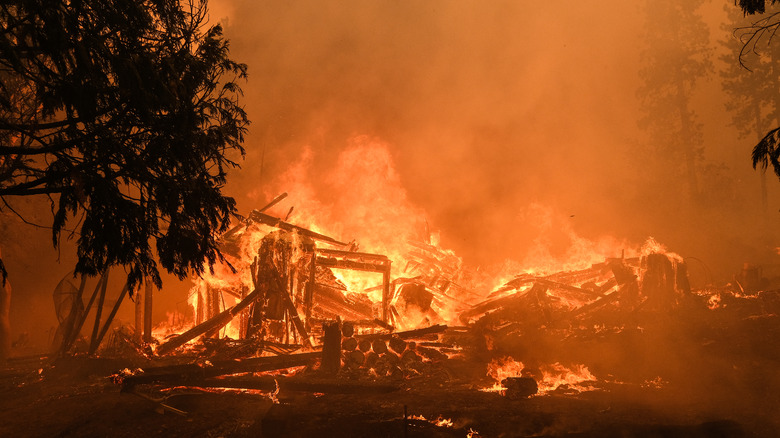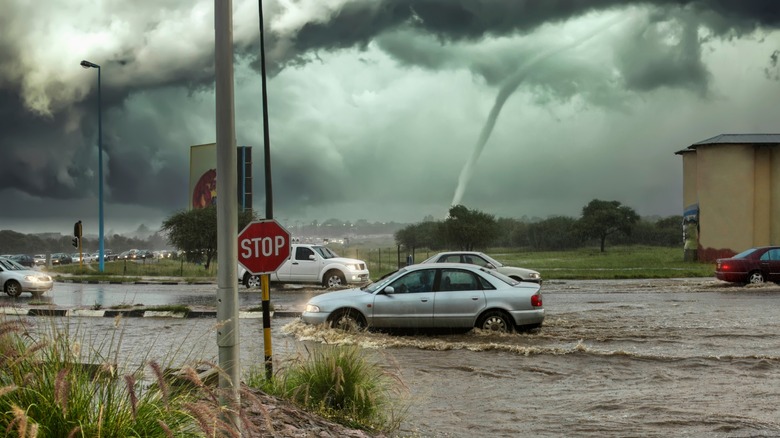In 10 Years, You Might Not Be Able To Get A Mortgage In This State
Under the shadow of a past year of devastating wildfires across the U.S., Federal Reserve Chair Jerome Powell quietly revealed the cost of wildfires is more than you think, particularly when it comes to accessing a mortgage. Speaking before a Senate Banking Committee, Powell told senators there were certain regions of the U.S. where getting a mortgage would be practically impossible due to extreme weather events, with at least California a near-given for becoming uninsurable.
Insurance companies are increasingly concerned about climate change and natural disasters. In addition to its impact on mortgages, the impact of climate change on auto insurance rates is increasing. For instance, some insurers in Florida have abandoned the state, with the number of home insurance policies dropped being more than two times previous years after 2022's Hurricane Ian. That leaves Floridians in a bad place for the next major extreme weather event, even impacting the average cost of owning a car in Florida. In relation, it may be nearly impossible to get a mortgage in California in 10 years.
Getting a mortgage in California may be impossible in a decade
Californians were recently left reeling by wildfires that devastated parts of the state, which was made even worse by the fact insurers like State Farm, Allstate, and Hartford had already given up on insuring homes in California. Going back to 2017, insurance companies operating in California were looking at $67 billion in insured costs, with the 2025 wildfires adding up to between $250 billion to $275 billion. That's around 4% of the state's GDP.
Thanks to Proposition 103, a California state law passed by voters in 1988, many insurance companies were given a loophole to dodge insuring Californian's homes. Proposition 103 was ironically supposed to work for the consumer, by protecting them from shady insurance practices like immediate rate hikes. The rule would require insurers to justify rising insurance premiums before they could do it. However, insurance companies argue the same rule makes it impossible for them to adjust to the new realities of extreme weather fast enough to not lose their shirts. The answer became to not insure houses in high risk areas of the state due to the heightened risk presented by climate change.
Here's how homeowner insurance could affect mortgage financing
Most financial institutions hold insurng your home as a prerequisite to giving you a mortgage, since, until you pay it off, the bank is basically a co-investor in your property. While it is possible to purchase a house without insurance, that would likely require that you have no mortgage because you've paid for the house outright with cash. In either case, a hurricane or wildfire destroying your home without insurance would be a huge loss for both you and your bank, although it's definitely more of a problem for you since you would end up homeless and short of all the equity paid into your home.
Assuming you find an insurer and buy a home, you'll need to ensure that your home remains insured while you're going through the process of paying off your mortgage. So if an insurer in California was to refuse to renew your policy after a major climate disaster, and you couldn't secure insurance from another company, the mortgage lender could force you to take insurance with a higher premium, or worse, force you into foreclosure. As per the National Centers for Environmental Information, from 1980 to 2024, there were 46 billion-dollar weather-related disasters in California. If the intensity and frequency of these disasters rise over the next decade, it's very unlikely insurance companies will want to offer home insurance coverage to people living in the state.


